
RESPONSIBLE CONSUMPTION AND PRODUCTION
Planet earth is running out of resources, but populations are continuing to grow. With the global population poised to reach 9.8 billion by 2050, the natural resources equivalent of almost three planets will be needed to sustain current lifestyles. We need to change our consumption habits and shift our energy supplies to more sustainable ones. The unsustainable use of various natural resources has impacted the world. Everyone needs to learn sustainable use of resources and production to undo the damage that has been done to the earth. Efficiency of resource use may be carried out by using policy instruments that create incentives to minimize wasteful use and consumption of natural resources.
According to the United Nations, the world's population is projected to increase from 7.6 billion in 2024 to 8.5 billion in 2030, 9.7 billion in 2050, and 10.4 billion by 2100. The equivalent of almost three planets would be needed to provide the natural resources necessary to sustain our current lifestyles. However, the resources on planet Earth are limited, and thus, responsible consumption and production will hold the key to the survival of our as well as future generations. Sustainable consumption and production means ?Doing more and better with less.?
Sustainable consumption and production involve encouraging resource and energy efficiency, as well as providing access to basic services, eco- friendly and reasonably good jobs, and a better quality of life for all. Its implementation helps accomplish overall development goals, curtailment of future economic, environmental, and social costs, and increase economic productivity. Sustainable consumption and production thus can contribute substantially to poverty alleviation and the transition towards low-carbon and green economies. Nitte DU is committed to achieving the goal by impacting its young students and employees by channelling their spirit of learning with a conviction for change.
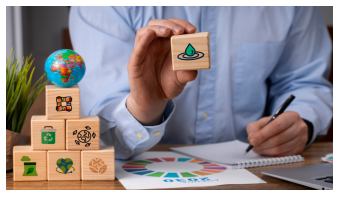
PROACTIVE STEPS TAKEN BY NU
Saving paper:
Less paper usage practice is in place to minimize the usage of paper. Official communications are done through email. Online Learning Management System platform ?NUeLearn? is implemented across the university to engage academic activities
http://nitte.edu.in/nuelearn
Students are encouraged to use the gadgets for academic activity. Library has switched to enhancement in e resource. Hardcopy of the essential documents are printed in both side of the pages.
Drafts of documents are printed on rough discarded paper that is blank on one side. Cardboard boxes and plastic cans of medicines and medical equipment are stored and sold to vendors for recycling.

Resource Recovery Point and Hermi Compost Unit:
Nitte Solid Waste Management Plant is set up in the university campus to efficiently channelize the solid waste into hermi compost.

Recycling::
Paper waste generated and cardboard box, plastic can are channelized to certified vendors for recycling.
The use of eco-friendly materials that are recyclable or made from recycled material is encouraged by the purchasing department. A prudent purchase department is functional and proactive in the reduction of redundancy in the purchase and under-utilization of material as well as equipment.
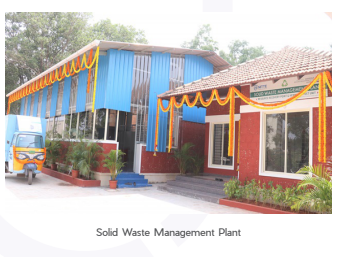
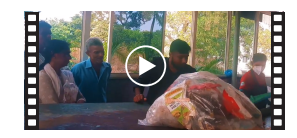
https://www.youtube.com/watch?v=erqv2CYfm-E&t=823s
Responsible consumption::
Purchase department takes utmost care in reduction of redundancy in procurement and underutilization of materials. Structured material indent procedure is fol lowed to avoid underutilization and over consumption of resources. Required materials are indented by the material- charge of that department and are approved by the Head of the department and the institution, materials are then received from the store with the bill and distributed to the concerned. Regular audits and stock checking ensure proper usage of all resources.

POLICY FRAMEWORK:
Policy on Reducing Plastic Waste: Nitte University is committed to reducing, reusing, and recycling plastic waste. It has several initiatives and a set of strategies aimed at reducing or eliminating the use of plastic materials on campus. It's important to note that achieving a "zero plastic" goal is incredibly challenging due to the wide use of plastic in various capacities in everyday activities.
http://nitte.edu.in/naac/2023/THE_IMPACT/Policies/plastic_Waste_policy.pdf
Policy on Food from aquatic ecosystems : Food from aquatic ecosystems include fish, shellfish, seaweeds, crustaceans, molluscs, algae, sea vegetables, and fish eggs. Fish and aquatic food systems are recognised as key sources to enhance food production and nutritional security. However, unsustainable use of aquatic ecosystems can lead to environmental degradation and collapse of established biodiversity and ecosystems. Currently, Nitte DU campuses does not serve food from aquatic ecosystems. This policy is drafted to ensure that the food on campus that comes from aquatic ecosystems is sustainably harvested in the event of introducing seafood/food from aquatic ecosystems on campuses in the future.
http://nitte.edu.in/naac/2023/THE_IMPACT/Policies/Policy_Food_aquatic_ecosystems.pdf
Research equipment's:
Nitte (DU) maintains a research equipment directory, which is displayed for public benefit on the website
https://nuresdir.wordpress.com
This enables all potential users on and off campus to be aware of the resources available on campus for responsible usage of equipment and prevents redundancy in the purchase and outsourcing. efficiently channelize the solid waste into hermi compost.
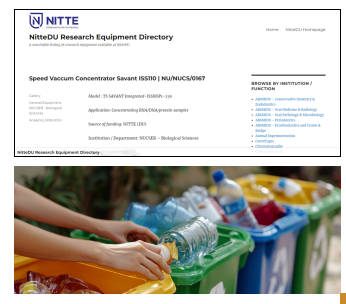
Water:
The University is proactively involved in water conservation missions. It has adopted environmentally friendly methods for water conservation and optimum use of water. Recycled water is used for maintaining the lush green landscape all around the year. Rainwater harvesting is adopted at all its campuses. Use of open wells and water bodies for rainwater harvesting is practiced. Open wells are the preferred source of water in place of borewells. Its policies and strategies are focused on the protection, conservation, and sustainable use of its precious freshwater resources. The grey water generated is recycled and reused for gardening, washing vehicles, and flushing water in all toilets on the campus. Signages requesting conserving water are put up in different places including hospital wards to create awareness among the patients.
Natural light and ventilation: The buildings are strategically constructed to utilizes the natural light to reduce power consumption and enhance cross ventilation.
Transportation: College buses are provided for the s t a f f a n d s t u d e n t s f o r transportation. Mass transportation avoids using the personal vehicle. Electric vehicles are provided to commute within and between the campus.

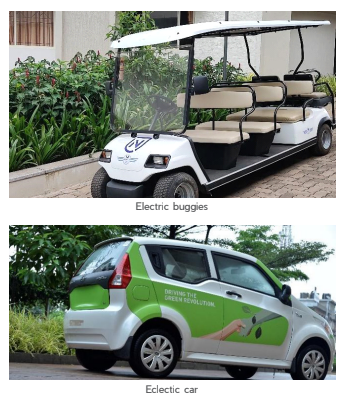
Energy prudence:
Conventional light fittings are replaced with energy-saving lights in a phased manner. They help reduce running costs and the life of motors in critical areas. Solar panels are installed on all campuses to generate electricity and to contribute towards green initiatives. Additionally, solar water heaters are installed in all hostels.
Periodical Maintenance/AMC of all electrical equipment including panels is undertaken by the maintenance department. All ACs beyond economical repair are replaced with 5-star inverter ACs. Replacement of normal lights with long-lasting LED lights to reduce electronic waste. Installation of educational signage towards conservation of energy near all exits of classrooms and offices. To contribute towards green initiatives, the University has entered into an open access agreement for Hydro and wind energy with M/s. AMR Power Pvt Ltd, M/s. Doddanavar Global Energy Pvt Ltd and M/s. Brindavan Hydropower Pvt Ltd. For all new installations, XLPE UG cables are being used which helps in maximising cable life and reducing expenditure. FRLSH copper wires are being used at all new installations. All old main panels in installations are being replaced in a phased manner with Single phase, Under / Over voltage protection switchgear products. Timers have been installed at various
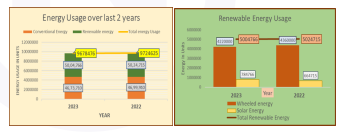
locations for switching on/ off security lights which helps in minimizing energy consumption. An energy audit is conducted to assess energy usage and conservation. Nearly 2/3rd of the total requirement comes from renewable energy sources. Solar Panels of about 500 KW capacity have been installed across the rooftops of most of the buildings on the university campus to maximize the use of on-site renewable energy generation wherever practical. More than 7 Lakh units are generated per year. Nitte DU encourages the use of Electric vehicles for transportation of students and staff.
Compared to year 2022, overall energy consumption is reduced in the year 2023. Marginally overall green energy consumption has increased. Solar energy usage has increased significantly.
Food
Community health and well-being are dependent on food. The institution provides healthy food in a hygienic atmosphere to all stakeholders on campus. The University constantly reminds the stakeholders of reduction of food wastage and the importance of nutrition. Educational information is displayed and played on the video at the hostel mess. The waste generated by the common kitchen is used for biogas production and the hostel mess waste is collected by a vendor who maintains a piggery. The manure produced by the piggery is used for horticultural purposes.
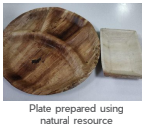
WASTE MANAGEMENT SYSTEM SOLID:
The wet waste and dry waste are sorted at the source. Recycling of organic waste is done by the biogas unit to utilize common kitchen waste. Strict compliance with provision for disposal of bio-medical and electronic waste. Re-using of scrap material is practiced. Restrictions on the use of bottled water to reduce plastic waste. Encouraging the use of eco-friendly materials in construction. The use of paper/plastic cups/ bottles is strongly discouraged. Board rooms are equipped with water filters and dispensers to avoid bottled water. Paper waste is sent to an external recycling unit vendor. Waste segregation is being carried out; o r g a n i c wa s t e i s composted in-house, a n d t h e m a n u r e generated is used for the gardens in the campus. Th e we t wa s t e i s tra n s ferred to t he composting pit. Dry waste is disposed of using the incinerator. Segregation of waste is done at source in the hospital, laboratories,
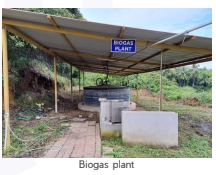
and common areas. Dedicated bins for waste management are made available - Green for degradable; Blue for plastic and metals; and Red for e-waste and batteries. Bins are placed in prominent positions on each campus with instructions displayed for public awareness. Hazardous chemicals used in laboratories are collected safely and disposed of through an authorized vendor. The hazardous fumes and solvents generated in laboratories are handled by the fume hood and the carcinogenic substances are handled with additional care and stored in a respective allotted place with the signage label ?Carcinogenic.? Used oil, oil-soaked cotton waste, and filters containing used oil from vehicles and machinery ? these are disposed of through an authorized vendor. An incinerator with a carbon scrubber is available for safe disposal of selected inorganic wastes. Strict compliance with provision for disposal of bio-medical and electronic waste.
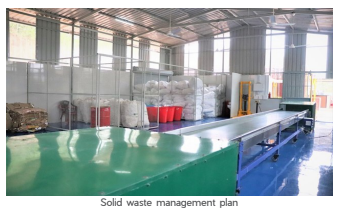
Liquid:
Sewage Treatment Plants (STP) are installed on all the campuses of Nitte DU. Effective use of treated water is ensured. Additionally, dual plumbing lines for toilets have been catered to in all buildings. are disposed of through an authorized vendor. An incinerator with a carbon scrubber is available for safe disposal of selected inorganic wastes. Strict compliance with provision for disposal of bio-medical and electronic waste.
Hazardous waste: Chemical and hazardous waste from laboratories is sent to a certified agency (M/s RAMKY Energy and Environment Ltd) for processing and no part of the waste is disposed of elsewhere.
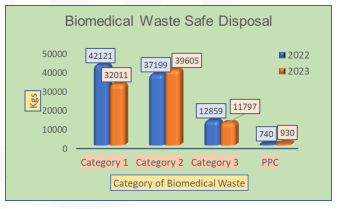
Biomedical waste: Biomedical waste is handled by a specialized waste disposal agency authorized by the Government Pollution Control Board (M/s RAMKY Energy and Environment Ltd.). Chemical and hazardous waste from laboratories is sent to a certified agency (AYUSH) for processing and no part of the waste is disposed of elsewhere. The generated electronic waste (e-waste) will be collected in e-waste collection and maintained by the maintenance department. Auction notice will be sent for Recyclers/ Reprocessors registered under the Central Pollution Control Board, Govt of India for Electronic waste. The air quality on campus is regularly monitored to enable the inhabitants of quality air to breathe and thrive. An aggressive tree planting drive by the faculty and students at the University is working towards reducing one's carbon footprint.

Awareness program and events:
- Nitte University Centre for Science Education & Research, in collaboration with the NSS & Youth Red Cross Units, Sustainable Development Goals Initiative, Nitte DU, conducted "The Tree Planting Event 2023" in Paneer Campus on June 5th, 2023.
- The NSS Unit of Nitte Institute of Communication (NICO) organized an e-waste collection drive between the 3rd & 8th July 2023 in collaboration with Mangala Resource Management Pvt. Ltd.
- The NSS Units of Nitte Institute of Communication and Nitte Institute of Architecture organised the NSS Orientation Day with a talk on 'Plastic Waste Management' at the University Auditorium, Paneer on 31st October 2023.
- As a part of Industry-Academia initiatives, an event on ?Act Now to be Sustainable - ways & means to reduce carbon emission as a scientist? was jointly organized by NUCSER and Eppendorf India Pvt. Ltd. on 9th October 2023.International E-Waste Day was celebrated by SDG Cell Nitte on 13th -14th October 2023. Nitte DU has been collecting and disposing of E-waste for the past 5 years.
- As a part of the community outreach program, Aura, and Authorcraft Clubs of NMAMIT, Nitte handed over 111 bundles of unused paper on 18th November 2023 to Vijetha Special School, Karkala to make books for children.
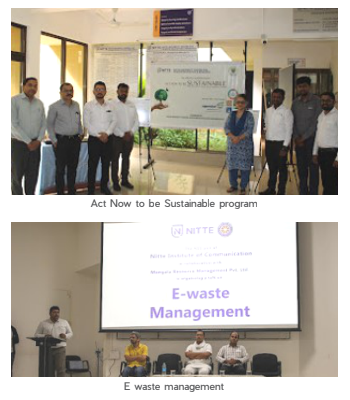



.png)
